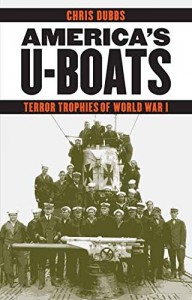Writer, Chris Dubbs, Shares Tips on Researching, Writing, and Publishing
 I first met Chris Dubbs in 2005, when I left my job as grant writer at Gannon University for another position. Chris was my replacement, and over lunch one day, I shared as much as I could with him about the grant-writing landscape at Gannon. So when I recently saw a notice about his latest book, America’s U-Boats: Terror Trophies of World War I, I asked him if I could buy him lunch and perhaps he could share some tips about researching, writing, and publishing with me. I thought this might help me with my research project on William Dimorier.
I first met Chris Dubbs in 2005, when I left my job as grant writer at Gannon University for another position. Chris was my replacement, and over lunch one day, I shared as much as I could with him about the grant-writing landscape at Gannon. So when I recently saw a notice about his latest book, America’s U-Boats: Terror Trophies of World War I, I asked him if I could buy him lunch and perhaps he could share some tips about researching, writing, and publishing with me. I thought this might help me with my research project on William Dimorier.
Chris has an impressive background: a business degree from Penn State, an MFA from the University of Oregon, college teaching experience, and some time spent at a research firm, all before his successful career at Gannon. As for his writing, he started with fiction, but found non-fiction to have a more-open landscape for publishing and has done so on topics, such as animals in space and private spaceflight.
How did Chris decide to write about U-boats? After finishing Realizing Tomorrow: The Path to Private Spaceflight, he solicited friends and relatives for ideas on what to tackle next. A friend suggested writing about the U-boat residing at the bottom of Lake Michigan. Once Chris started looking into the subject, he was hooked.
The Research
To conduct his research, Chris uses a number of resources, including the New York Times archives, the Library of Congress, the National Archives, and ProQuest. For his latest book, he also interviewed a number of divers, who provided valuable information about the sunken watercraft.
For telephone interviews, Chris often uses a digital recorder, but he always takes notes as a backup. He learned not to rely solely on the recorder, when he conducted a stellar interview only to find out later that the conversation didn’t record.
The Writing
To capture all of the information he amasses when researching, he uses a single Word document and from that, an outline starts to reveal itself. He then pulls from the research document into the manuscript draft. For the U-boat book, he didn’t have to be extremely detailed with citing his sources, because it is considered a social history. With some of his other books, however, he was required to use end notes and provide a detailed bibliography.
The Publishing
Regarding publishing, Chris was fortunate to collaborate in past projects with other established writers, so when he decided on the U-boat project, he approached an editor at the University of Nebraska Press, which had published him previously. The editor seemed interested, so Chris sent a proposal, and then received the go-ahead to proceed with his project. After submitting his draft to the publisher, he received the services of a copywriter, who suggested subtle changes, such as the correct abbreviations for military-personnel titles.
Working with a publisher means there’s a deadline, and Chris finds this helpful to keep him from getting bogged down in research. He has also found that collaborating with other writers has a similar effect.
It usually takes Chris from 18 to 24 months to research and write one of his books, and once he sends it to the publisher, it’s another 18 months before it hits the shelves.
Promotion and Future Plans
I asked Chris how he was promoting his new book, and he said that he has been contacting World War I organizations, historical societies, and maritime-history organizations. He also created a Facebook page, called UB-88, where he posts vintage photos of U-boats and interesting World War I military figures. Through that page, he has sparked some lively discussions and made valuable connections.
What’s next for Chris? He’s working on another book about World War I. It explores people who traveled to Europe to visit battlefields and cemeteries, including mothers of sons whose bodies were buried there. It sounds odd at first, but not when you consider how many people visit Gettysburg every year.
I came away from my lunch with Chris with some great information. He encouraged me to get to work on a proposal and gave me some suggestions on how to treat William Dimorier’s biography and poetry. I’m even going to create a Facebook page for Dimorier.
For more information on America’s U-Boats: Terror Trophies of World War I and other books that Chris has written, go to Amazon or Barnes & Noble.
Ann Silverthorn is a blogger who also writes about a wide variety of topics in numerous genres, including non-fiction, fiction, poetry, travel, and grant writing.
Twitter: @annsilverthorn
Instagram: ann_silverthorn




Leave a Reply